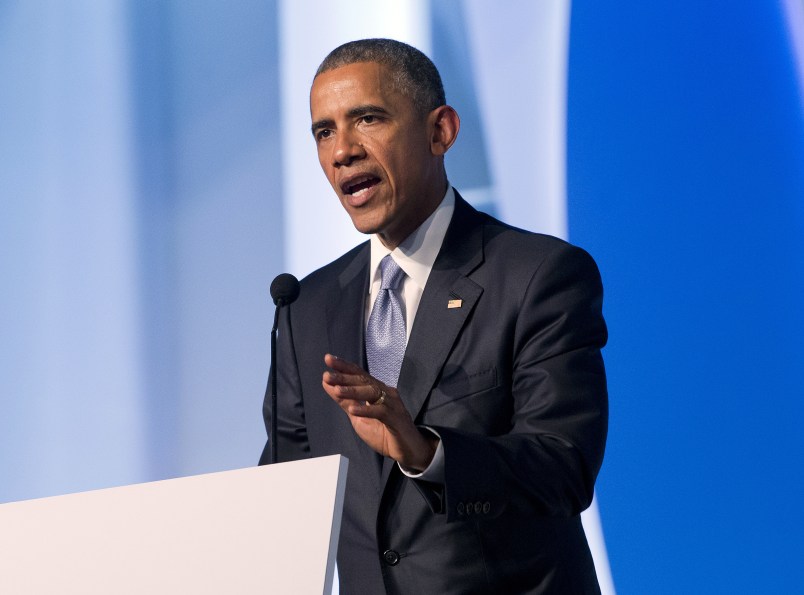PANAMA CITY (AP) — President Barack Obama declared his refusal to refight the Cold War battles of the past on Saturday while Cuban President Raul Castro rallied to his defense, absolving Obama of fault for the U.S. blockade in a stunning reversal of more than 50 years of animosity between the United States and Cuba.
Castro, in a meandering, nearly hour-long speech to the Summit of the Americas, ran through an exhaustive history of perceived Cuban grievances against the U.S. dating back more than a century — a vivid display of how raw passions remain over American attempts to undermine Cuba’s government.
Then, in an abrupt about face, he apologized for letting his emotions get the best of him. He said many U.S. presidents were at fault for that troubled history — but that Obama isn’t one of them.
“I have told President Obama that I get very emotional talking about the revolution,” Castro said through a translator, noting that Obama wasn’t even born when the U.S. began sanctioning the island nation. “I apologize to him because President Obama had no responsibility for this.”
In a remarkable vote of confidence from a Cuban leader, Castro added: “In my opinion, President Obama is an honest man.”
Castro and Obama were expected to meet later Saturday on the sidelines of the summit — the first substantial meeting between a U.S. and Cuban president in more than five decades. The flurry of diplomacy was aimed at injecting fresh momentum into their previously announced plan to restore normal relations between the U.S. and Cuba.
Speaking just before Castro, Obama acknowledged that deep differences between their countries would persist. Yet he said he was uninterested in getting bogged down in ideology, instead casting the thaw in relations as an opening to create “more opportunities and resources for the Cuban people.”
“The United States will not be imprisoned by the past,” President Barack Obama said. “We’re looking to the future.”
Raising the stakes even higher for the two leaders was mounting speculation that Obama would use the occasion of the summit taking place in Panama to announce his decision to remove Cuba from the U.S. list of state sponsors of terrorism, a gesture that for Cuba holds both practical and symbolic value.
The U.S. long ago stopped accusing Cuba of conducting terrorism, and Obama has signaled that he’s ready to take Cuba off the list. On Thursday, he suggested an announcement was imminent when he revealed that the State Department had completed its lengthy review of the designation.
Obama arrived at the summit Saturday morning for a day of marathon meetings with leaders from across the Western Hemisphere, gathered around a massive oval table with two birds of peace in the middle. He was also to take questions from reporters before returning to Washington.
A successful relaunch of U.S.-Cuba relations would form a cornerstone of Obama’s foreign policy legacy. But it’s an endeavor he can’t undertake alone: Only Congress can fully lift the onerous U.S. sanctions regime on Cuba, and there are deep pockets of opposition in the U.S. to taking that step.
___
Reach Lederman at http://twitter.com/joshledermanAP and Kuhnhenn at http://www.twitter.com/jkuhnhenn
Copyright 2015 The Associated Press. All rights reserved. This material may not be published, broadcast, rewritten or redistributed.







Miami Herald, April 11, 2015.
Authorities in Florida are searching for fragments of Sen Marco Rubio’s (R-FL) head which unexpectedly exploded moments after reports of the apparent detente between Presidents Obama of the United States and Castro of Cuba. Witnesses were startled when strange noises began emanating from Sen. Rubio’s head and hot gases began escaping from his ears. As bystanders bid a hasty retreat, Sen. Rubio’s head was rent asunder by a massive explosion that demolished an adjacent Papa John’s pizzeria and shattered windows several blocks away. Fortunately there were only minor injuries and no fatalities were reported, but authorities are still assessing the damage, estimated to be in the millions of dollars.
Fragments of the head were said to have been hurled as far as the Everglades and one elderly woman in Saratoga, Mrs. B.J. Prepuce, 81, was slightly injured as a piece crashed through the roof of her house and into a cup of hot Ovaltine, the resulting splashing of hot liquid, mildly scalding her.
The cause of Sen. Rubio’s head explosion is currently a matter of speculation, but pre-existing conditions coupled with Obama Derangement Syndrome (ODS) is considered the most probable. The National Science Foundation is asking anyone who finds head fragments to turn them in to the authorities for future study.
We will update this report as more details come in.